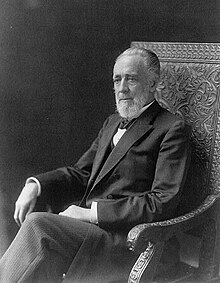Henry Moore Teller
| Henry Teller | |
|---|---|

Teller in 1902.
|
|
| 15th United States Secretary of the Interior | |
|
In office April 18, 1882 – March 3, 1885 |
|
| President | Chester A. Arthur |
| Preceded by | Samuel J. Kirkwood |
| Succeeded by | Lucius Q.C. Lamar |
|
United States Senator from Colorado |
|
|
In office March 4, 1885 – March 3, 1909 |
|
| Preceded by | Nathaniel P. Hill |
| Succeeded by | Charles J. Hughes, Jr. |
|
In office November 15, 1876 – April 17, 1882 |
|
| Preceded by | None |
| Succeeded by | George M. Chilcott |
| Personal details | |
| Born |
May 23, 1830 Granger, New York, U.S. |
| Died | February 23, 1914 (aged 83) Denver, Colorado, U.S. |
| Resting place | Fairmount Cemetery, Denver, Colorado |
| Political party |
Republican (1876–1897) Silver Republican (1897–1903) Democratic (1903–1909) |
| Profession | Lawyer, business manager |
| Religion | Methodism |
| Military service | |
| Allegiance |
|
| Service/branch | Colorado Militia |
| Years of service | 1864–1867 |
| Rank | Major General |
Henry Moore Teller (May 23, 1830 – February 23, 1914) was an American politician from Colorado, serving as a US senator between 1876–1882 and 1885–1909, also serving as Secretary of the Interior between 1882 and 1885. He strongly opposed the Dawes Act, intended to break up communal Native American lands and force assimilation of the people, accurately stating that it was directed at forcing the Indians to give up their land so that it could be sold to white settlers. Among his most prominent achievements was authoring the Teller Amendment which definitively stated that, following the Spanish–American War, the U.S. would not annex Cuba rather that the purpose of their involvement would be to help it gain independence from Spain.
Henry Moore Teller was born into a large Methodist family on a farm in Granger, New York, in 1830. Educated at local academies when he was young, he went on to take up teaching in order to pay his way through law school. He interned in the office of Judge Martin Grover of Angelica, New York, and became a lawyer in 1858. Although was admitted to the state bar, he moved to Morrison, Illinois where he practiced law for three years and helped establish the Republican Party of Illinois. Following that, in 1861 Teller set up a law office in Central City, present day Colorado where he married Harriet M. Bruce and had two sons and a daughter. During that time, Teller also served as major general of Colorado militia from 1864 to 1867. In 1865, Teller was one of the chief organizers of the Colorado Central Railroad, writing its original charter and becoming its president for five years. Afterwards, until Colorado achieved statehood, Teller continued work as a corporate attorney where he would gain enough prominence to be admitted to its upcoming Senate.
Following Colorado's admission to the Union in 1876, Teller was elected by state legislature to be senator. He served a brief three-month term, and was then elected for his first full six-year term, going on to be re-elected three more times and representing Colorado in the Senate for over 25 years. In 1882, President Chester Arthur named Teller secretary of the interior after Samuel Kirkwood resigned on April 17 of that year. As interior secretary, Teller had oversight of the Bureau of Indian Affairs, and vigorously opposed the allotment of Indian lands.
Beginning in 1880, Teller became ardently connected with the Free Silver question, doing much in and out of Congress with tongue and pen. He was instrumental in securing a declaration in favor of bimetallism, and he was a conspicuous actor in the prolonged fight in the Senate against its unconditional repeal following the 1892 Republican National Convention. The decision thus made was to indefinitely keep the gold standard intact and, in response, Teller and 24 others marched out of the convention. As a staunch supporter of bimetallism, along with being a prominent figure, he joined the other leading Silver Republicans and became leader of the Silver Republican Party. However, as bimetallism increasingly fell out of national politics, the party lost much of its influence and many Silver Republicans returned to the Republican Party. Unlike them however, Teller never returned to the Republican Party.
...
Wikipedia
